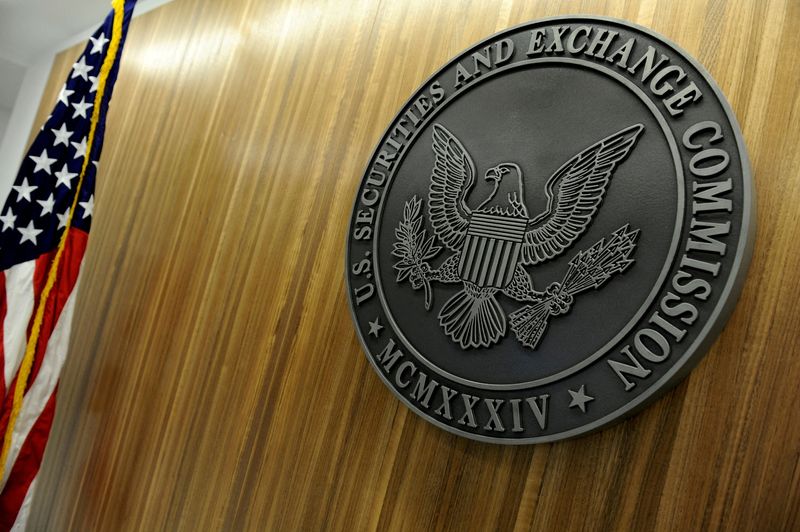
© Reuters. FILE PHOTO: The seal of the U.S. Securities and Exchange Commission hangs on the wall at SEC headquarters in Washington, June 24, 2011. REUTERS/Jonathan Ernst/File Photo
By John McCrank
NEW YORK (Reuters) – The U.S. Securities and Exchange Commission is set to vote on Wednesday on advancing rule proposals related to the handling and execution of stock orders that would represent the biggest changes to the equities markets in nearly two decades.
SEC Chair Gary Gensler has said the changes would make the markets fairer and more competitive by increasing transparency, creating a more even playing field between stock exchanges and off-exchange trading venues, and exposing retail orders to more potential buyers and sellers.
WHAT ARE THE PROPOSED CHANGES?
The five SEC commissioners, including Gensler, will vote on Wednesday to consider four measures related to how the U.S. markets work, and one on enhancing disclosures around insider trading arrangements.
Of the four market structure-related proposals, the “order competition rule” represents the biggest potential change.
The rule would require stock orders from individual investors that have no price limits to be sent to auctions where market participants could compete to fulfill them.
Most of these types of orders are sent by retail brokers to wholesale brokers, sometimes in exchange for payments, that execute them at prices at, or better than, the best prices available on exchanges.
SEC commissioners will also vote on proposing a new standard for brokers to show they are getting the best possible executions for their clients’ orders.
Another proposal would allow exchanges, which are currently only allowed to display buy and sell prices in one-cent increments, to offer sub-penny prices, enabling them to better compete with broker-run trading venues, which do not have tick constraints, so can offer better prices. The rule would also lower exchange access fees.
The regulator will also consider whether to strengthen an existing rule requiring brokers to provide information on the quality of their customer trade executions.
WHO WOULD BE IMPACTED BY THE CHANGES?
The order competition rule, which would require marketable retail orders to be sent to auctions, could lead to more such orders being matched on exchanges, like the Nasdaq or Intercontinental Exchange (NYSE:) Inc’s New York Stock Exchange, rather than by wholesale brokers, like Citadel Securities and Virtu Financial (NASDAQ:).
The NYSE and Nasdaq and Citadel Securities declined to comment.
Virtu recently sued the SEC over the lack of response to a public information request by the company over who the regulator was meeting with and what data it was looking at while the new rules were being drafted.
The proposed order competition rule could also dent the profits of retail brokers, like Charles Schwab (NYSE:) Corp and Robinhood Markets Inc (NASDAQ:), that take payments from wholesale brokers in exchange for their customer orders.
Schwab declined to comment and Robinhood did not respond to a request for comment.
The proposal to allow exchanges to display sub-penny prices could allow exchanges to better compete with broker-run trading venues, which at times execute nearly half of U.S. stock volume. Lowering exchange access fees could also make exchanges more attractive places to execute trades, but it would also reduce the ability for exchanges to offer rebates to win order flow.
The new best execution standard for brokers could also impact payments to retail brokers from wholesalers and exchanges for order flow.
WHEN WOULD THE CHANGES GO INTO EFFECT?
The SEC rulemaking process can take years. If the rule proposals are passed, they will be put out for public comment, typically for 30 to 60 days, and then the SEC will consider the comments as it drafts the final rules.
The last major shakeup of the markets was Regulation National Market System, adopted in June 2005 but which did not come into law until 2007.
The SEC declined additional comment.


Be the first to comment